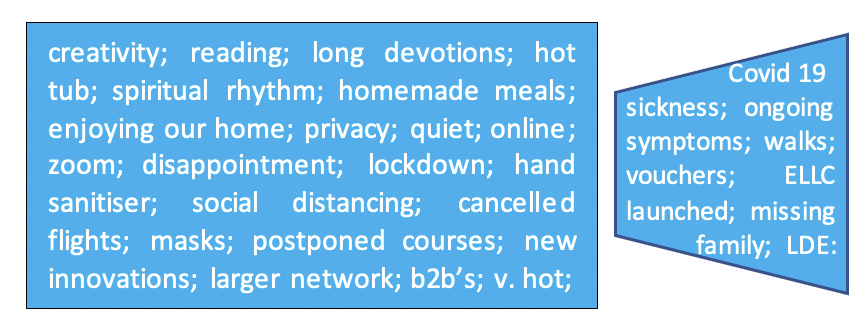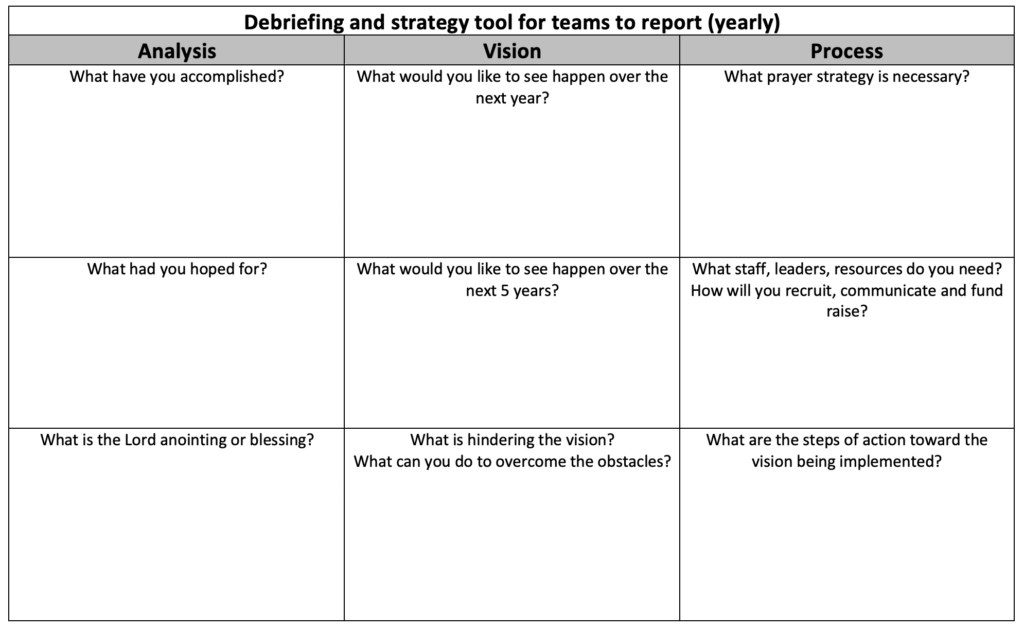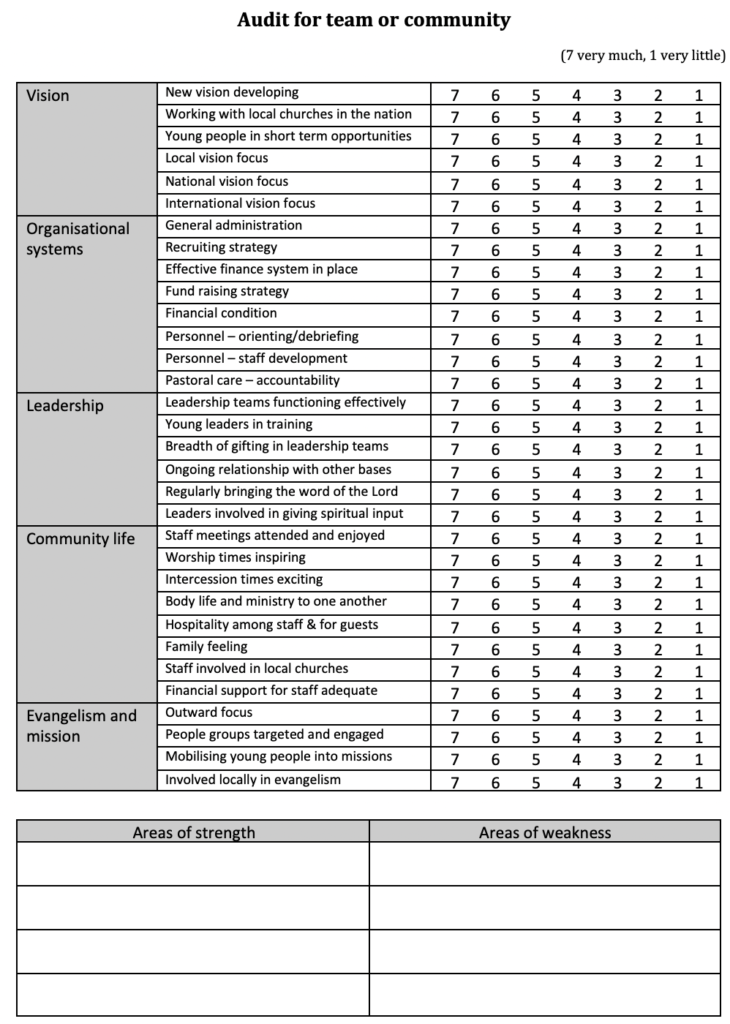
Take a look at 6 approaches to debriefing this year.
Finding God in all things is at the core of Ignatian Spirituality and is rooted in our growing awareness that God can be found in everyone, in every place and in everything. Isn’t it amazing that nothing is wasted in God’s economy? As we look back, it’s often through the most challenging situations that we grow the most, but there is an ‘if’. If we reflect. It’s not ‘experience’ that is the best teacher but ‘evaluated experience.’ If we want our ministries to be maximised, we need to have regular times of looking back to debrief and to evaluate. Then with our newfound knowledge, look forward to allowing God to light up our path so we can plan, strategise and set some goals and targets for the new season. This can be applied personally or as a family or as a ministry.
- Step 1: In my experience the year end is an ideal time to do a yearly debrief as an individual or as a team – how am I/we doing, having drunk the cups of blessing and sorrow over this last year? What needs to be worked through and brought to closure? What are my/our losses and gains?
- Step 2: Do an evaluation on your roles, responsibilities, achievements and fruitfulness (or lack of). If you get into a rhythm of yearly goal setting, it’s good to evaluate your goals and how you performed and explore the whys of success and failure. Ask what went well, what could be improved and what needs a new approach?
- Step 3: Put your new knowledge to work in prayerfully setting new goals for the new year. You may have a theme for the year, a key verse or scripture passage, targets for staff/students, ministries to begin, pruning of ministry and roles, a new rhythm of time management, etc …
Here are a few approaches to debriefing the year – it’s always good to mix it up and we have had a habit of creatively coming up with a new approach each year that stops any sense of ‘here we go again!’ So choose one that suits you – you may want one individually, another as a family and another as a ministry.
1. Intentional and unintentional pruning – in my life, family & ministry

We have been talking about this topic of pruning in YWAM over the last months. Pruning is a yearly process that every gardener has to learn. When a garden isn’t pruned, it becomes overgrown, unmanageable and not nice to look at. And it doesn’t take long for fruit bearing plants and trees to lose their productivity. With this in mind, it’s dangerous for us to let a year go by without debriefing, evaluating and applying the pruning metaphor to all we are doing in individual, family and ministry life.
- Pruning that has taken place that has been out of our control? In this COVID season, many have experienced their ministry being stopped. We can find our job has changed, or certain relationships move on, finance dries up, someone in the family is sick and changes have to be made, …
- Dead wood that needs to be removed? Perhaps some of the activities, events, jobs that you have been doing don’t really bring any fruit and you just do them because you have always done them, or it is expected. If something doesn’t bring life, then get rid of it.
- Certain branches that may have some fruit but need to be removed as they are taking the plant in the wrong direction? As you look back its easy to get involved in so many things and they all have some fruit connected but the question is – what are the priorities? Boundaries have to be made in order for us to concentrate on what’s really important.
- What requires cutting back for new growth to come? It’s wonderful when we see fruit from our efforts, but a new season requires new growth and room has to be made for that to happen – in ourselves, in our families and in our ministries. This is the hardest thing to do – it may involve delegation, structure change or refocusing of our efforts.
2. Creating a word picture for the year

Our learning styles vary and so we can mix up our approaches to debriefing and evaluating. Many like words and it may be easy for you to come up with words to express your feelings and thoughts for the past season. But you can also combine this with a picture that helps you sum up the year.
- What words sum up the year? Think of at least 40-50+ positive and negative words.
- What has God been teaching you as you read all these words?
- What object or symbol is significant for you
this year? See if you can put all the
words you have written into the shape you just thought of.
Eg home; computer screen; zoom icon; heart; anchor; cross; …
Here’s a personal example: creativity; reading; long devotions; hot tub; spiritual rhythm; homemade meals; enjoying our home; privacy; quiet; online; zoom; Disappointment; lockdown; hand sanitiser; social distancing; cancelled flights; Covid 19; sickness; ongoing symptoms; vouchers; leadership development encounter; LDE; missing family; very hot; b2b’s around the world; ELLC; …

3. The weather this year

I grew up in London where every conversation starts with a comment on the weather. There must be more words to describe the weather in the UK than anywhere else in the world as it changes so often. Here in Spain all you can say is – beautiful again! It’s no secret that we moved here for the weather because we opened up a retreat centre and knew that other people would come for the weather too! Loren’s comment was – someone has to go there! So why not us!
- Where has the sun been shining? Things you are grateful for? Times of closeness with God? Enjoyable activities that brought fun and laughter? Projects that brought a sense of fulfilment and a job well done? Perhaps you had certain achievements and goals met? Or times where you simply felt at peace and content?
- Where have there been dark clouds? What challenges have you faced? Where has there been fears, doubts, and struggles? Where did you have to go through disappointment, hurt and perhaps conflict? Were there times you had to work through losses – loss of a loved one, love of a friendship or colleague, loss of a certain involvement…? Sometimes we have dark days for no initial obvious reason, but we have to work through feelings of depression.
- There always seems to be this mix of sunshine and clouds – this is a simple debrief that Ignatius calls ‘the prayer of examen.’
4. Rooms of your home

Have you ever thought about the time you spend in different rooms in your home? How effective is the time you spend in each place? We made a change this year – with less guests coming to stay, I moved my computer and desk into one of the bedrooms from a place under the stairs. Suddenly my efficiency has been tripled. I have my own private space where I can think and write and zoom to my heart’s content, instead of a harry potter’s existence under the stairs!
- Bedroom – your resting, sleeping, rejuvenating, intimacy…
- Bathroom – your washing and cleansing, dressing, image, make up or lack of…
- Study – your reflecting, journaling, reading, thinking, learning…
- Kitchen – preparing meals for yourself and others, health…
- Dining room – eating and nourishment, communion, having guests…
- Lounge – family, entertainment, deepening relationships, enjoying friends, heart to heart…
- Office – workload, connecting, tasks, roles, projects, achievements, failures, …
- Attic/basement – junk stored, place to hide things, no one sees, clutter, messy, stuff from the past still lurking there, …
- How much time do I spend in these rooms? Does this need to change?
- If I was to rearrange the house, do a spring-clean or renovation where do I start?
5. Thinking about the hats you wear

Our tendency is to add new hats (roles and responsibilities) without passing any on to others. So, our lives become more stressful as our hats multiply. Our time then is spread between more responsibilities and we don’t focus on or fulfil any of them as we could or should. We also need to think of our team members and how to keep them motivated and growing in their leadership and maturity – passing on a leadership role to them is of vital importance.
- What hats am I wearing or adding? – roles I have – grandparent, parent, spouse, friend, leader…. Perhaps you are taking on a new role and you need to think about what it entails.
- How are the hats fitting – which ones need redesigning? We have job descriptions for our work roles, but we should have a sense of job description for our relational roles too. How are we fulfilling those roles? Perhaps a role of spouse or parent needs to change as the season changes – different time schedules, different age of kids requiring a different approach, ministry roles developing with growth in leadership and expansion of vision, …
- Which hats have you been wearing too long? Some hats we continue to have – spouse, parent and friend but our leadership roles will be changing. It’s easy to get very comfortable and relax into a ministry role that is not healthy.
6. Packing for trips

You would think that after all the trips I have been on, I would be better at packing by now but there are always items that I forget and others that sit in the suitcase or backpack that I just don’t use. When we have moved from one house to the next there are those few boxes that just sit there in storage – sometimes they sit there for 5 years+ and neither Rite nor I look at them! Are they important? – probably not but they somehow find a spot in the moving van along with the rest of the important stuff. Now we are packing for a move to Canada and those boxes, with who knows what inside, have to go finally!
- What’s been in your suitcase that you will always take? What events, traditions, customs, activities were a success and will continue to be in our agenda this next year? What happened this year that you would consider a success? – things that brought encouragement, goals met, things that brought a smile to your face and warmed your heart?
- What stuff do you often take that you don’t need? What is peripheral in your life right now? What commitments are you questioning if you should be doing? What ‘time fillers’ need to be cut out?
- What did you forget to pack that was important? What are some of the things that didn’t happen that with some effort or creativity could have made a difference? What new structures need to be in place for your personal or ministry life? What rhythms were missing? What relational commitments didn’t seem to happen?
The important thing to remember in debriefing and evaluating is to open ourselves up to the Lord in fresh ways. Allow a creative approach to bring a unique appreciation of what has taken place in your life. It is helpful also to mix up the method to keep a novel interest and not a feeling – ‘we have been through all this before!’ So, take some time alone, with your family and with your team to use one of the metaphors to reflect on your past year and learn more of what God has been seeking to teach you.
Until next year
Stephe
P.S. See the attached forms you can use for your team evaluation and forward thinking.


